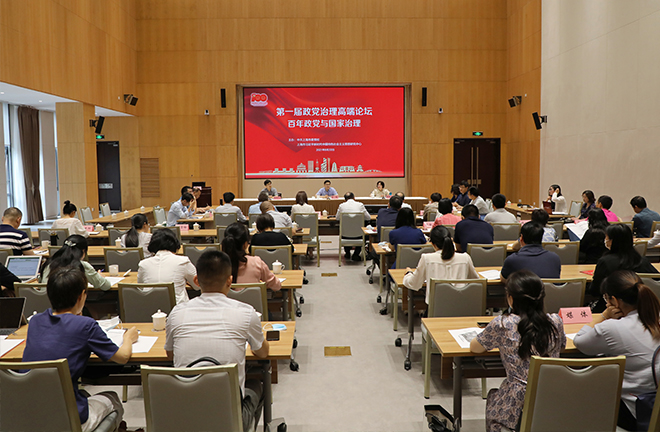Experts discuss CPC’s governance of China

The international symposium on the experience and enlightenment of the Communist Party of China governing the country takes place in Shanghai on July 20. Photo: Zha Jianguo/CSST
SHANGHAI—Experts shed light on the experience and enlightenment of the Communist Party of China (CPC) governing the country, at an international symposium on July 20.
Combining the basic principles of Marxism with China’s concrete reality and with China’s refined traditional culture, the CPC established, in the history-honored Eastern country, a new type of state system and governance system that ensures that its hundreds of millions of people run the country. It has also facilitated the miracle of rapid economic growth and long-term social stability, contributing Chinese wisdom and a Chinese approach to political parties around the world.
Key to success
Du Zhanyuan, head of China Foreign Languages Publishing Administration, said that the key to the CPC’s success lies in four aspects. First, the CPC has always prioritized the people, maintained close ties with the people, and represented the interests of the people in the process of reform, development, progress, and prosperity.
The Party has been constantly exploring the right path, Du continued. “The tremendous changes that have taken place in China have irrefutably proved that only socialism with Chinese characteristics can solve the problems of development and progress in contemporary China.”
The CPC has strengthened self-construction and theoretical innovation, continuing to develop in the face of risks and tests in various historical periods. In addition, the Party has grasped the direction of China’s development in the overall global situation and the trend of the times, promoting the common development and prosperity of all countries. Upholding the common values of peace, development, fairness, justice, democracy, and liberty, the CPC promotes the construction of a community of shared future for mankind, Du noted.
The CPC was born at a critical moment when the Chinese people were fighting for national independence and establishing a new society and new culture, said Saikhansanaa Khurelbaatar, foreign affairs advisor to the General Secretary of the Mongolian People’s Party. The CPC has demonstrated amazing resilience under extremely difficult conditions and has deeply and successfully changed Chinese society. Especially under the leadership of General Secretary Xi Jinping, the CPC has acted on the vision of making development people-centered. China’s development model has greatly improved domestic development indicators.
Looking back on the history of the past century, Feng Yujun, deputy director of the Institute of International Studies at Fudan University, said that the CPC regards practice as the sole criterion for testing truth, and combines the basic principles of Marxism with the concrete practice of Chinese revolution, construction, and reform, and also with refined traditional Chinese culture. The Party has embarked on a path that is in line with the developmental direction of human civilization, thus ensuring rapid economic growth for decades, the continuous optimization of the economic structure, and the continuous improvement of people’s living standards.
Yang Fengcheng, executive director of the Institute of CPC History and Party Building at Renmin University of China, said that one piece of the CPC’s successful experience in governing the country involves scientifically studying the historical position and formulating the country’s medium- and long-term development strategies in a timely manner to promote the country’s growth and socio-economic development.
Building a better world
Yuri Tavrovsky, a professor at the People’s Friendship University of Russia, said that the CPC has adopted universal Marxist theories and has been advancing with the times according to specific national conditions, gradually forming a new combination of theory and practice, which is called socialism with Chinese characteristics. This is an epitome of state and social governance.
Socialism with Chinese characteristics is most suitable for China, and it is the only explanation for China’s vitality and sustainability in recent years, Tavrovsky continued. The CPC has actually created a new development model and a new standard for national and global governance for human society. The CPC has changed the destiny of China, Tavrovsky said.
The world today is undergoing major changes unseen in a century. The COVID-19 pandemic has accelerated the evolution of the major changes. Mankind has entered a new era of interconnection. The interests of all countries are closely related and their destinies are closely linked. Global threats and challenges require a strong global response. China proposes to build a community of shared future for mankind, which shows a major country’s responsibility and commitment.
At present, the COVID-19 pandemic has evolved into a global crisis. Saikhansanaa Khurelbaatar suggested that countries and nations should build a new concept of international relations on the basis of cooperation in fighting the pandemic, maintaining world peace and development, and building a better and more peaceful world through solidarity and cooperation.
